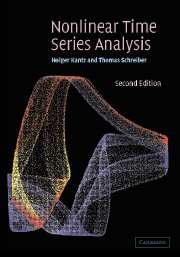Book contents
- Frontmatter
- Contents
- Preface to the first edition
- Preface to the second edition
- Acknowledgements
- I Basic topics
- II Advanced topics
- 9 Advanced embedding methods
- 10 Chaotic data and noise
- 11 More about invariant quantities
- 12 Modelling and forecasting
- 13 Non-stationary signals
- 14 Coupling and synchronisation of nonlinear systems
- 15 Chaos control
- A Using the TISEAN programs
- B Description of the experimental data sets
- References
- Index
10 - Chaotic data and noise
Published online by Cambridge University Press: 06 July 2010
- Frontmatter
- Contents
- Preface to the first edition
- Preface to the second edition
- Acknowledgements
- I Basic topics
- II Advanced topics
- 9 Advanced embedding methods
- 10 Chaotic data and noise
- 11 More about invariant quantities
- 12 Modelling and forecasting
- 13 Non-stationary signals
- 14 Coupling and synchronisation of nonlinear systems
- 15 Chaos control
- A Using the TISEAN programs
- B Description of the experimental data sets
- References
- Index
Summary
All experimental data are to some extent contaminated by noise. That this is an undesirable feature is commonplace. (By definition, noise is the unwanted part of the data.) But how bad is noise really? The answer is as usual: it depends. The nature of the system emitting the signal and the nature of the noise determine whether the noise can be separated from the clean signal, at least to some extent. This done, the amount of noise introduces limits on how well a given analysing task (prediction, etc.) can be carried out.
In order to focus the discussion in this chapter on the influence of the noise, we will assume throughout that the data are otherwise considerably well behaved. By this we mean that the signal would be predictable to some extent by exploiting an underlying deterministic rule – were it not for the noise. This is the case for data sets which can be embedded in a low dimensional phase space, which are stationary and which are not too short. Violation of any one of these requirements leads to further complications which will not be addressed in this chapter.
Measurement noise and dynamical noise
When talking about noise in a data set we have to make an important distinction between terms. Measurement noise refers to the corruption of observations by errors which are independent of the dynamics. The dynamics satisfy xn+1 = F(xn), but we measure scalars sn = s(xn) + ηn, where s(x) is a smooth function that maps points on the attractor to real numbers, and the ηn are random numbers.
- Type
- Chapter
- Information
- Nonlinear Time Series Analysis , pp. 174 - 196Publisher: Cambridge University PressPrint publication year: 2003



